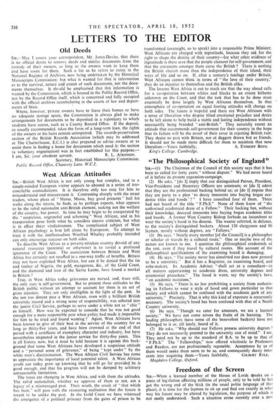"The Philosophical Society of England"
Sta,—(1) The Chairman of the Council of this society says that it has been so called for forty years "without dispute." We had never beard of it before its present expansion-campaign.
(2) He asks, [do I] imply that our distinguished Patron, President, Vice-Presidents and Honorary Officers are amateurs; or [do I] admit that they are the professional backing behind us; or [do I] impute that they are party to a plan 'to decoy innocents into buying bogus aca- demic titles and hoods ' ? " I have consulted four of them. Three had not heard of the title " F.Ph.S." None of them knew of "the authorised academical dress of a Fellow." Their backing has, without their knowledge, decoyed innocents into buying bogus academic titles and hoods. A former West Country Bishop forbade an incumbent to wear the society's hood in his diocese. The wearer referred, in defence, to the society's distinguished backers. About 130 clergymen and 90 laymen, mostly without degrees, are "Fellows." (3) He says, "Nearly every member [of the Council] is a philosopher or scholar or travels by a cultural route." One or maybe two of the names are known to me. I question the philosophical credentials of the rest, even if they travel by cultural routes. His account of the philosophical qualifications of the examining board is damaging.
(4) He says, "The society never has simulted nor does now pretend to be a university." But it has .a Registrar, an examining board, and robe-makers. Its Academic Adviser "shall act as a consultant—in all matters appertaining to academic dress, university degrees and ceremonial procedure." The hood is worn, say the society's laws, "on academic occasions."
(5) He says, There 'is no law prohibiting a society from authoris- ing its Fellows to wear a style of hood and gown particular to that society and which cannot be confused with the academic garb of any university." Precisely. That is why this kind of exposure is recurrently necessary. The society's hood has been confused with that of a North Country university.
(6) He says, "Though we cater for amateurs, we are a learned society." We have not come across the fruits of its learning. The leading philosophers (save some of the benevolent backers) have not belonged to it or, till lately, heard of it.
(7) He asks, "Why should our Fellows possess university degrees ? They do not necessarily pretend to the university cast Of mind." I see. They need not be up to the standard of B.A. to be up to that of " F.Ph.S." The "Fellowships," now offered wholesale to Professors and Readers, are not professionally reputable. Acceptance by us of them would make them seem to be so, and consequently decoy inno- cents into acquiring them.—Yours faithfully, GILBERT RYLE, Magdalen College, Oxford.


































 Previous page
Previous page